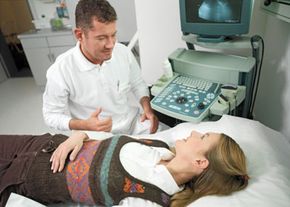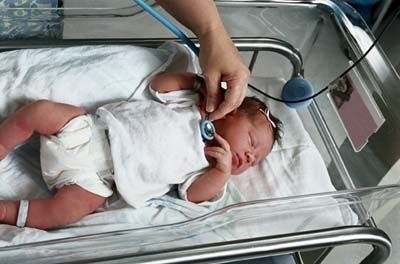A miscarriage doesn't necessarily mean that there's a problem with the mother's reproductive function. The most common -- and unpreventable -- cause of first-trimester miscarriage is an abnormality in the fetus's chromosomes. This is usually a result of a mishap in the division process or an abnormal egg or sperm cell. But a miscarriage that occurs in the second trimester of pregnancy is usually related to an issue in the mother's reproductive system. Remember, though, this is just a general rule.
Hormonal factors include illnesses that involve an imbalance in the mother's hormone levels. Such illnesses include Cushing's syndrome, thyroid disease and polycystic ovary syndrome.
Not surprisingly, a poorly controlled chronic condition can have adverse effects on a pregnancy. Conditions like diabetes, if they're not taken care of properly, can increase the risks of miscarriage and birth defects. High blood pressure, lupus and an underactive or overactive thyroid can also cause problems.
Certain acute infections can be passed to the fetus or placenta and also put the mother at risk. In developing countries, malaria is a main cause of miscarriages. In these areas, pregnant women are two to three times more likely to get malaria than nonpregnant women [source: MedScape]. Malaria can also cause low birth weight, premature delivery and stillbirth. In developing countries, common infections include walking pneumonia, rubella, chlamydia, gonorrhea, herpes and toxoplasmosis, which can acquired from being around cat feces.
Abnormalities in a woman's reproductive anatomy can also cause a miscarriage. For example, some women may have a septum (dividing membrane) that separates the uterus into sections. Because this septum has poor blood supply, the placenta will have trouble growing, depriving the embryo of nourishment. Lack of muscle tone at the cervix (the opening of the uterus into the vaginal canal) also makes a miscarriage more likely. Many women develop uterine fibroids. Although they're benign, a poorly placed fibroid -- like one that blocks the embryo's implantation and blood supply -- can cause a miscarriage.
Lifestyle factors are also an important factor. Smoking has been shown to increase the risk of miscarriage. And it doesn't have to be the mother's smoking -- one study focused on fathers who smoke. It found that if the father smokes 20 or more cigarettes a day, the mother's risk of miscarriage increases by 81 percent [source: American Journal of Epidemiology]. Alcohol consumption during pregnancy is also harmful. One study showed that a mother who drinks more than 30 ounces of alcohol a month doubles her miscarriage risk. Another study showed that women who have more than three drinks a week in the first trimester had an increased risk of miscarriage. It is important to note that it has not been determined how much alcohol is safe during a pregnancy, and most American doctors recommend complete abstinence. And not surprisingly, the use of illicit drugs greatly increases the chance of miscarriage and birth defects [source: UpToDate Patient Information].
Some (not as conclusive) studies have shown an increased risk of miscarriage in women who drink excessive amounts of caffeine. Many doctors recommend limiting caffeine intake to 200 milligrams or less per day, which equals about two cups of coffee [source: March of Dimes].
It's just as important to consume the right things as it is to avoid the wrong things. Malnourished mothers also have an increased chance of miscarriage. Severly underweight women are often not healthy enough to get pregnant. And certain conditions that develop during pregnancy -- such as the rare illness hyperemesis gravidarum, which may result in severe malnutrition and dehydration -- can cause a woman to have excessive vomiting,
Finally, trauma can cause a miscarriage. It is important here to distinguish between physical trauma and emotional trauma. There is little proof that emotional trauma -- fear, grief, anger or stress -- results in an increased risk of miscarriage. However, physical trauma does greatly increase the risk. This includes surgeries that could possibly compromise the safety of the uterus. These types of procedures are usually performed only in emergency situations.
On the next page we'll look at the warning signs of a miscarriage.







